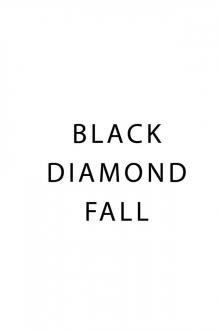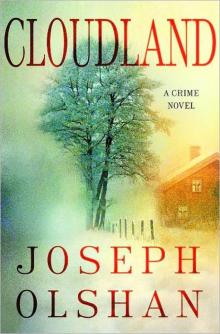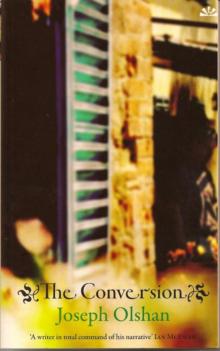- Home
- Joseph Olshan
Nightswimmer Page 2
Nightswimmer Read online
Page 2
Then you. You walked out of World Gym.
Peter nudged you playfully with his shoulder and you both began strolling along Lafayette. I thought jealously, How sweet: they went to pump up together before getting it on. This must be some hunk Peter snagged at the Morning Party; no wonder he got back so early.
Sure, I would have liked to subvert this pickup, but I knew there were no grounds for doing so. Peter Rocca and I had never had any real commitment. Throughout our fling, he’d remained attached to another man with whom he’d been involved intermittently for a couple of years. What first drew me to Peter, in fact, was the Saturday afternoon I was walking down this very street when I saw his superhero’s build tumble out of World Gym, closely trailed by a compact swarthier version, a man who wore his hair in an exaggerated pompadour. The other man, whose name, I learned, was Sebastian, began screaming obscenities at Peter. Initially Peter tried to walk away, but when the litany kept up, he finally whirled around, rushed back and tackled Sebastian right there on the sidewalk. I watched them struggle until Peter seized the advantage, pinned Sebastian and began strangling him. “I love you, Peter, I’ll always love you,” Sebastian garbled as he was being choked. Yet before I could figure out what to do, a couple of other guys from the gym came out and broke up the fight.
What compelled me was how the pompadoured man, in the midst of being throttled, could keep declaring his love. Some might call this a sick desperation, but I have to say there’s something in me that respects people who put themselves on the line, who risk appearing like complete fools.
From my distance I could see that you were broadly built with ashen coloring and tight black curly hair. I was as yet too far away to see your small piercing eyes. Peter spotted me immediately, however, and waved. I tried to keep walking.
“Come on, Will, stop acting like an asshole and get over here!” he trumpeted. “This is Sean.” He introduced us immediately. “Sean Paris.”
You barely said hello; it was hard to tell if you were shy or arrogant, and I dismissed you the way I figured you dismissed me. Good solid body, I’d give you that. Great legs of the hockey player variety—okay, so legs are my particular weakness. I figured that Peter was in the midst of leading you back to his apartment, fourteen stories above Sixth Avenue, with panoramas of downtown and of the Empire State Building, whose upper-story lights would die out romantically on the stroke of midnight. Those were the lights that he and I had often watched expire after sex.
When Peter invited me to walk with the two of you along Waverly Place, it was an invitation that both confused me and created for us all an awkward silence. I remember noticing the way you floated along the street, wide shoulders slumped slightly forward, the sort of body whose gangly magnificence at rest would come gracefully alive with speed. You inhabited every inch of your body, unlike Peter, who, though bigger and sexier by gym standards, would always strike me as a skinny boy silhouetted at the core of a muscle man.
Once we reached Peter’s building, he invited us both upstairs. I accepted, you declined and then we all said goodbye. Peter and I proceeded into the lobby. “I’m glad you’re coming up, because I think that guy was after me.”
“I think it was mutual attraction, Peter.”
“I’m not bullshitting, I’m telling you the truth.”
“Truth notwithstanding, he’s beautiful.”
“Shaddup, you.” Peter punched me in the arm and then bit my shoulder. He was fidgety and I could tell that he was horny. Fine with me, I thought in a sudden rush of arousal as Peter rang for the elevator.
Then came the knock on the outside lobby door. You’d changed your mind.
You’d left the Morning Party on a hunch that something was supposed to happen back in New York City. At first it seemed what was going to happen was Peter Rocca, whom you’d met on the ferry crossing back to Sayville. But then the moment you began walking away from his building that night you realized that what was going to happen was me.
And so we all sat in Peter Rocca’s pristinely decorated living room—you and I on a chintz-covered sofa. There was a lamp made from a carved crystal globe and a reproduction Louis XIV writing desk. The gleaming parquet floor was covered by a Turkish area rug that had burned my knees the first time Peter and I went at it with the abandon of complete anonymity. He was hardly a stranger to me by now, and yet, Peter’s double invitation made absolutely no sense at all.
When it came to sex, Peter certainly had his share of quirks. He was a morning-sex person. Whenever I would spend the night he’d wake up early and, before we did anything, would jump out of bed, and, still naked, vacuum the rugs in his apartment and polish the glass coffee table and furniture with a vengeance. Then after he was done cleaning and before he rushed off to patients suffering from phobic disorders, he’d be ready for a berserk ten-minute quickie. He loved getting it on all over the apartment. Standing by the picture windows in full view of the apartment house across the street, either he’d lift me up or I’d lift him up and we’d hike to the next location. We did it on the kitchen counter, on the kitchen floor, and then finally, predictably, ended up in the shower. I called this routine our Sexual Stations of the Cross. Thinking about all this, I chuckled.
“What’s with you?” he said.
“Nothing, leave me alone.”
“Then tell me, what do you want to drink?”
“Beer.”
“How about you, Sean?”
“Do you have Red Label and soda?”
“Sure do.”
God, are you as pretentious as your taste in alcohol, I nearly asked. “So, where are you from, Sean Paris?” I said instead.
Detecting my sarcasm, you frowned at me. “From here.”
All transplanted New Yorkers get defensive when you ask them this question. “I mean, from originally.”
“A lot of places. My father was military. The last place I ever lived with my parents was Okinawa.”
“How long in the city?”
“Four years.”
“You’re still in the honeymoon period,” I concluded rather abruptly and then asked what you did for a living.
“Landscape architecture.”
“Must be slim pickings in all this concrete.”
You rolled your eyes. “Everybody always says that.” Then you explained that most of the firm’s work was out-of-town business.
I pegged you for one of those really cute but ultimately boring out-of-town boys, ones who have come to the city to reinvent themselves, who can’t stop reveling in all the heathen pleasures: late-night discos, jack-off clubs, designer drugs. Had you learned to commit all the sins of the eye? Perhaps you were just shy—I tried to give you the benefit of the doubt—not the sort of man to effuse conversation.
Suddenly the phone rang and Peter grinned maniacally over his shoulder as he went to answer it. Overhearing his frantic chatter, I knew he was speaking to Sebastian, the pompadour. You were now sitting slightly hunched over, staring rhapsodically into the cut crystal glass of good Scotch. Slowly, however, you shifted your vulpine gaze and caught mine. And I think that must’ve been the first time I ever saw you straight on. I was singed by that split-second glance before you looked away.
“Were you at the Morning Party?” you said.
Suddenly nervous about meeting that eerie gaze again, I was barely able to explain that I’d decided not to go, that I have difficulty with crowds. What was wrong with me? I now ventured to look at you, and this time your stare forcibly struck. Then I knew who you were. I knew why you’d changed your mind. I knew why you had to come back.
“Is he heading over now?” I asked when Peter returned from his telephone call.
“I explained that the two of you were here and told him I’d call back later.”
“You sure he’s not going to just show up like he did last time?”
“Why should he? He doesn’t like you.”
“And who could blame him?” I laughed.
“He thinks
Will is keeping us apart,” Peter explained to you.
“Certainly it’s easier for him than facing the fact that Peter is keeping the two of them apart,” I quipped. Turning to Peter, I said something like “I don’t know why you put yourself through all of this nonsense. Either marry him or move on,” when behind me you said, “Leave him alone, Will!”
I spun back around, but was paralyzed by your dimpled, mischievous grin. And by something else, too; something that you gave off—a loaded calm. A midwinter feeling, like standing in a pine forest, watching the snowflakes fall, hearing their soundless bedlam.
“Part of the reason why Sebastian wants to come over is that we were supposed to meet out on the Island,” Peter went on, “but he could never get there. Apparently, all the trains got screwed up.”
“That’s because somebody jumped in front of one of them.”
Then I explained how I’d come by the news.
I distinctly remember that you looked perturbed for a moment and then the placid look resurfaced. Suddenly you were standing. “Well, guys, got to go.”
“Me too,” I chimed in, standing also. Peter cast me a baffled glance and I claimed that I was tired.
Finally alone as we stood together in front of Peter’s building, you and I were making up our minds. It’s amazing to think how the outcome of a single conversation can break open a whole new territory.
“So which way are you headed?” you said.
“I can head your way.”
“Come on, then.”
And somehow I knew that fourteen stories above us, Peter was watching to see if I’d accompany you. At one point, halfway down the block, I even swerved to look back; and Peter saw that, too, the guilty gesture, the futile wish to cover my tracks. Later on, Peter would tell me that that image of me walking away with you, then swiveling around in a moment of hesitation, would be the one summer memory that would stay with him. Not the rooftop barbecues on Twenty-third Street, not the pickups at Splash and Fire Island, not even the Morning Party. No, the remembrance of two dark figures walking away, and then one turning around like Lot’s wife looking back at the cities of the plain.
THREE
WE WERE STROLLING WEST toward your neighborhood of crooked brownstones with chipping paint and quiet, in some cases neglected, gardens. We were walking through what seemed like a fissure of the night. The full moon brushed the streets with a tingling opalescence and a hot wind spiraled through the rest of Greenwich Village. Gates of town houses squeaked and cawed as people passed through, their muted conversations just beyond us. The whole city seemed to become our encounter, or, better than that, our encounter seemed to be at its heart.
“So who is he?” you asked after several minutes of silence.
“What do you mean, who is he?”
You could have meant Peter. Or even the railroad suicide. But, most mysteriously, you had guessed the secret of ten years. “The guy that burned you,” you said.
“I don’t know what you’re talking about. Nobody burned me.”
Your eyes held me steadily. “I don’t believe it.”
So strange, your insistence, and so frightening. Such a twist on the fact that I am usually the one who makes overly pointed conversation with complete strangers. You walked along a few paces ahead of me, leading the way to wherever we were headed, and your question continued to fluster me even though you said nothing more. You were the first person who had ever sensed immediately that his life still stalked mine.
“I loved him like a fucking idiot,” I said finally. “Okay? Like nobody before or after.”
“So what happened?”
“What difference does it make? I’m here, aren’t I? He’s obviously not in my life anymore.”
“Is he still alive?”
I told you right away that I didn’t know and declared that I would speak no more about him.
As we walked along Seventh Avenue you told me that you’d developed a skill at “sussing out” new people. As a child of a military father, you’d grown up in different parts of America, as well as in Okinawa, and that meant sitting around lots of dinner tables where you were expected to be quiet. And so you became astute at observing peccadillos, picking up the telltales of people’s character. Sometimes you’d even been able to sense which of your parents’ friends were cheating on their spouses.
As you spoke to me, however, all I could think about was the first electric touch of you, a caress of my fingers along your pale, beautifully formed arm after a soft collision of our shoulders. We finally reached your place on Grove Street, and just outside the building entrance you turned to me.
“Will, I’d like to invite you in. For a few minutes. But for an innocent few minutes.”
I frowned. “And what’s that supposed to mean?”
“Just what it says.”
Finding you even more compelling now that I was beginning to strike the flint of a personality, I told myself I would not take no for an answer, and that I would have you. I would have you that very night.
You lived in a fourth-floor walkup, whose stairwell was paved with a runner of red carpeting and hung with antique Buddhist tankas. As we climbed to the top floor, I confessed to owning several tankas myself.
“I used to follow Buddhism,” I said, explaining that for me it had been an erotically driven interest. One of my ex-lovers was Buddhist, and by following his religion, I had once made myself indispensable to him.
“The same guy that burned you?”
“No. Somebody else.”
“Been busy in your life, haven’t you?” You grinned.
A tall door opened into an apartment with high ceilings and grand windows facing Grove Street. We were hit with a gust of pent-up heat and the smell of laundry starch that would soon become one of the scents of you. You crossed the room to raise all the windows and lean out for a moment. The night was sonorous with the drone of air conditioners, Manhattan’s own species of cicada. Full moonlight was reaching through the massive arms of an ailanthus tree that loomed up from the small courtyard below. In the dim glow I noticed the dark shape of a piano, its sullen gleam.
Once you switched on the lights, I could see that the piano keys were covered with all sorts of bills and papers, the piano bench was strewn with underwear and socks and workout shorts—the apartment was a holy mess. The floor was littered with T-shirts, canvas carry bags, army fatigues—both full-length and cut-off—a Patagonia shell that hinted a sporting life, and all sorts of dog-eared seed and bulb catalogues. One wall held framed mounts of exotic butterflies; and on the fireplace mantel, on either side of a curious-looking basket that looked to be woven out of 16-millimeter film, were two stuffed wood ducks with emerald heads and rings around their throats.
“I see you like dead things.”
“Well-preserved dead things. My uncle was a taxidermist.”
Beneath one of the windows sat a square mahogany dining table that was covered with jelly glasses sullied with fruit pulp, white plates bearing remnants of several-days-old salad. Quite a contrast to the fastidious preservation of taxidermy. Next to the dishes was a small pile of slim blue aerograms, those nearly weightless letters that, I imagined, had been written by old lovers.
Every single guy I’d ever loved had been meticulously neat and had always derided me for being a hardcore slattern. When I remarked, “You’re even messier than I am,” you surveyed the room with a bemused expression and said, “Lately it’s gotten out of hand.” Most people would have apologized; you hardly seemed to care that I might judge you.
There was no sofa, and so you sat down in one dining chair and offered the other one to me. The place had been very run-down when you first took over the lease. That you renovated, scrubbed the fireplace, scraped the walls and repainted them (and probably ingested lead)—all this was explained to me. And as you talked I noticed a blush in your cheeks that usually vanishes by the age of twenty-five, but whose lovely tint had obviously remained with you at least as far as thi
rty-one. Soft tight dark curls, those pale wolverine eyes.
Jesus Christ, he’s really stunning, I said to myself. Not the sort of beauty that turns heads in the street, but rather the wan beauty that gains dimension the more you look at it.
I found myself unable to make any more superficial conversation. All I cared about was making my move in full challenge of the fact that I’d been invited to this apartment “for an innocent few minutes.” I managed to cantilever myself forward and squeeze my two knees around one of your massive legs. I was rewarded with a wary look. “You think I’m going back on what I said?”
“People do.”
“Not this people.”
“So you’re stubborn.”
A shrug. “I’d like to have dinner with you sometime.”
“So what’s precluding that?”
“Nothing at all. Except, uh, you’re squeezing my leg.”
I must have looked pretty crestfallen because you went on to say, “Look, Will, I think you’re attractive. What’s the big rush?”
“We could have fun now and eat later,” I suggested.
The wary expression ripened into annoyance. “Are you always so insistent? Do you always expect to have everyone you want?”
“Do you always expect people to tell you their secrets?”
“I left off, didn’t I?”
“For the time being.”
You wrenched your leg out from between the press of my knees, leaned back in your chair. “This is going to be a tough tournament.”
“Why does it have to be a tournament?”
“I’m just calling it the way I see it.”
One look at me, you now explained, and you knew we were suffering the same affliction: that a part of ourselves had been torn out, stitched to some stranger’s heart and gone molten in the heat of other loves. There were others like us roaming the cities of the world, the broken homeless ones sifting through the litter of one-night stands, of short-term loves, for that missing piece. You said that our hunt would probably take us to the ends of our lives and that in all likelihood we’d never become whole again.

 Black Diamond Fall
Black Diamond Fall Cloudland
Cloudland Nightswimmer
Nightswimmer The Conversion
The Conversion